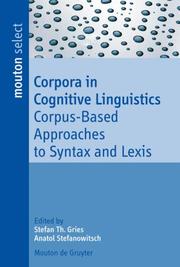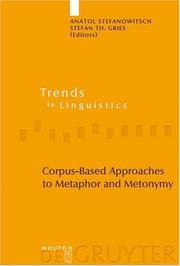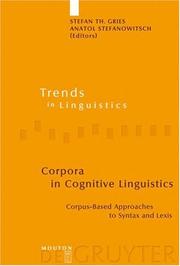| Listing 1 - 10 of 21 | << page >> |
Sort by
|
Book
ISBN: 9783411743582 Year: 2018 Publisher: Berlin Dudenverlag
Abstract | Keywords | Export | Availability | Bookmark
 Loading...
Loading...Choose an application
- Reference Manager
- EndNote
- RefWorks (Direct export to RefWorks)
Political philosophy. Social philosophy --- General ethics --- German language
Book
Year: 2020 Publisher: Language Science Press
Abstract | Keywords | Export | Availability | Bookmark
 Loading...
Loading...Choose an application
- Reference Manager
- EndNote
- RefWorks (Direct export to RefWorks)
Corpora are widely used in linguistics, but not always wisely. This book attempts to frame corpus linguistics systematically as a variant of the observational method. The first part introduces the reader to the general methodological discussions surrounding corpus data as well as the practice of doing corpus linguistics, including issues such as the scientific research cycle, research design, extraction of corpus data and statistical evaluation. The second part consists of a number of case studies from the main areas of corpus linguistics (lexical associations, morphology, grammar, text and metaphor), surveying the range of issues studied in corpus linguistics while at the same time showing how they fit into the methodology outlined in the first part.
Language Arts & Disciplines / Linguistics --- Language arts --- Language Arts & Disciplines --- Linguistics --- General
Book
Year: 2020 Publisher: Language Science Press
Abstract | Keywords | Export | Availability | Bookmark
 Loading...
Loading...Choose an application
- Reference Manager
- EndNote
- RefWorks (Direct export to RefWorks)
Corpora are widely used in linguistics, but not always wisely. This book attempts to frame corpus linguistics systematically as a variant of the observational method. The first part introduces the reader to the general methodological discussions surrounding corpus data as well as the practice of doing corpus linguistics, including issues such as the scientific research cycle, research design, extraction of corpus data and statistical evaluation. The second part consists of a number of case studies from the main areas of corpus linguistics (lexical associations, morphology, grammar, text and metaphor), surveying the range of issues studied in corpus linguistics while at the same time showing how they fit into the methodology outlined in the first part.
Language arts --- Language Arts & Disciplines --- Linguistics --- General
Book
Year: 2020 Publisher: Language Science Press
Abstract | Keywords | Export | Availability | Bookmark
 Loading...
Loading...Choose an application
- Reference Manager
- EndNote
- RefWorks (Direct export to RefWorks)
Corpora are widely used in linguistics, but not always wisely. This book attempts to frame corpus linguistics systematically as a variant of the observational method. The first part introduces the reader to the general methodological discussions surrounding corpus data as well as the practice of doing corpus linguistics, including issues such as the scientific research cycle, research design, extraction of corpus data and statistical evaluation. The second part consists of a number of case studies from the main areas of corpus linguistics (lexical associations, morphology, grammar, text and metaphor), surveying the range of issues studied in corpus linguistics while at the same time showing how they fit into the methodology outlined in the first part.
Language Arts & Disciplines / Linguistics --- Language arts --- Language Arts & Disciplines --- Linguistics --- General
Book
ISSN: 13876724 ISBN: 9789027223951 9789027270948 9027223955 1306090601 9027270945 Year: 2013 Volume: v. 41 Publisher: Amsterdam: Benjamins,
Abstract | Keywords | Export | Availability | Bookmark
 Loading...
Loading...Choose an application
- Reference Manager
- EndNote
- RefWorks (Direct export to RefWorks)
Historical linguistics --- Comparative linguistics --- Dialectology --- Motion in language --- Language and languages --- Linguistic change. --- Mouvement dans le langage --- Variation (Linguistique) --- Changement linguistique --- Variation. --- Linguistic change --- Variation --- Motion in language. --- #KVHA:Taalkunde --- #KVHA:Cognitieve linguïstiek --- #KVHA:Typologie --- Languages & Literatures --- Philology & Linguistics --- Psycholinguistics --- Change, Linguistic --- Language change --- Characterology of speech --- Language diversity --- Language subsystems --- Language variation --- Linguistic diversity --- Variation in language --- Linguistics --- Language and languages - Variation

ISBN: 9783110198263 3110186055 9783110186055 3110198266 1282194070 3110197707 3119162914 9783110197709 9781282194076 Year: 2006 Volume: 172 Publisher: Berlin: Mouton de Gruyter,
Abstract | Keywords | Export | Availability | Bookmark
 Loading...
Loading...Choose an application
- Reference Manager
- EndNote
- RefWorks (Direct export to RefWorks)
Cognitive Linguistics, the branch of linguistics that tries to "make one's account of human language accord with what is generally known about the mind and the brain," has become one of the most flourishing fields of contemporary linguistics. The chapters address many classic topics of Cognitive Linguistics. These topics include studies on the semantics of specific words (including polysemy and synonymy) as well as semantic characteristics of particular syntactic patterns / constructions (including constructional synonymy and the schematicity of constructions), the analysis of causatives, transitivity, and image-schematic aspects of posture verbs. The key characteristic of this volume is that all papers adopt the methodological perspective of Corpus Linguistics, the rapidly evolving branch of linguistics based on the computerized analysis of language used in authentic settings. Thus, the contributions do not only all provide various new insights in their respective fields, they also introduce new data as well as new corpus-based and quantitative methods of analysis. On the basis of their findings, the authors discuss both theoretical implications going well beyond the singular topics of the studies and show how the discipline of Cognitive Linguistics can benefit from the rigorous analysis of naturally-occurring language. The languages which are investigated are English, German, Dutch, and Russian, and the data come from a variety of different corpora. As such, the present volume will be of interest to a wide range of scholars with many different foci and interests and should pave the way for further integration of usage-based techniques of analysis within this exciting paradigm.
#KVHA:Syntaxis --- #KVHA:Taalkunde --- #KVHA:Cognitieve linguistiek --- 801.56 --- 801.56 Syntaxis. Semantiek --- Syntaxis. Semantiek --- Cognitive grammar --- Cognitive linguistics --- Grammar, Comparative and general --- Psycholinguistics --- Data processing. --- Data processing --- Lexicology. Semantics --- Mathematical linguistics --- Information systems --- Grammaire cognitive --- Informatique --- Cognitive grammar - Data processing. --- Cognitive linguistics. --- corpora. --- data analysis.

ISBN: 3110186047 9783110186048 9783110198270 9783110199895 3110199890 1282194941 9781282194946 9786612194948 6612194944 3110198274 Year: 2006 Volume: 171 Publisher: Berlin: Mouton de Gruyter,
Abstract | Keywords | Export | Availability | Bookmark
 Loading...
Loading...Choose an application
- Reference Manager
- EndNote
- RefWorks (Direct export to RefWorks)
The papers in this volume deal with the issue of how corpus data relate to the questions that cognitive linguists have typically investigated with respect to conceptual mappings. The authors in this volume investigate a wide range of issues - the coherence and function of particular metaphorical models, the interaction of form and meaning, the identification of source domains of metaphorical expressions, the relationship between metaphor and discourse, the priming of metaphors, and the historical development of metaphors. The studies deal with a variety of metaphorical and metonymic source and target domains, including the source domains SPACE, ANIMALS, BODY PARTS, ORGANIZATIONS and WAR, and the target domains VERBAL ACTIVITY, ECONOMY, EMOTIONS and POLITICS. In their studies, the authors present a variety of corpus-linguistic methods for the investigation of conceptual mappings, for example, corpora annotated for semantic categories, concordances of individual source-domain items and patterns, and concordances of target-domain items. In sum, the papers in this volume show how a wide range of corpus-linguistic methods can be used to investigate a variety of issues in cognitive linguistics; the combination of corpus methods with a cognitive-linguistic view of metaphor and metonymy yields new answers to old questions (and to new questions) about the relationship between language as a conceptual phenomenon and language as a textual phenomenon.
Information systems --- Lexicology. Semantics --- Mathematical linguistics --- Metaphor --- Metonyms --- Cognitive grammar --- Data processing --- Métaphore --- Métonymie --- Grammaire cognitive --- Data processing. --- Informatique --- #KVHA:Cognitieve linguistiek --- #KVHA:Metaforen --- #KVHA:Metoniemen --- #KVHA:Taalkunde --- 801.56 --- 801.56 Syntaxis. Semantiek --- Syntaxis. Semantiek --- Metonymy --- Figures of speech --- Parabole --- Reification --- Cognitive linguistics --- Grammar, Comparative and general --- Psycholinguistics --- Metaphor - Data processing --- Metonyms - Data processing --- Cognitive grammar - Data processing --- Cognitive linguistics. --- corpora. --- data analysis.
Book

ISBN: 128293418X 9786612934186 3110226421 9783110226423 9783110226416 3110226413 Year: 2010 Publisher: Berlin Boston
Abstract | Keywords | Export | Availability | Bookmark
 Loading...
Loading...Choose an application
- Reference Manager
- EndNote
- RefWorks (Direct export to RefWorks)
In line with the increasing use of empirical methods in Cognitive Linguistics, the current volume explores the uses of quantitative, in particular corpus-driven, techniques for the study of meaning. It shows how these techniques contribute to the core theoretical issues of Cognitive Semantics as well as how they inform semantic analysis. The research presented in the volume constitutes an important step towards an Empirical Cognitive Semantics.
Cognitive grammar. --- Computational linguistics. --- Semantics. --- Formal semantics --- Semasiology --- Semiology (Semantics) --- Comparative linguistics --- Information theory --- Language and languages --- Lexicology --- Meaning (Psychology) --- Automatic language processing --- Language data processing --- Linguistics --- Natural language processing (Linguistics) --- Applied linguistics --- Cross-language information retrieval --- Mathematical linguistics --- Multilingual computing --- Cognitive linguistics --- Grammar, Comparative and general --- Psycholinguistics --- Data processing --- Lexicología y Semántica Inglesas (31103209) |x Bibliografía recomendada --- Cognitive Linguistics.


ISBN: 9783110197709 9783110186055 Year: 2008 Publisher: Berlin ;; Boston De Gruyter Mouton
Abstract | Keywords | Export | Availability | Bookmark
 Loading...
Loading...Choose an application
- Reference Manager
- EndNote
- RefWorks (Direct export to RefWorks)
Digital

ISBN: 9783110226423 9783110226416 Year: 2010 Publisher: Berlin ;; Boston De Gruyter Mouton
Abstract | Keywords | Export | Availability | Bookmark
 Loading...
Loading...Choose an application
- Reference Manager
- EndNote
- RefWorks (Direct export to RefWorks)
| Listing 1 - 10 of 21 | << page >> |
Sort by
|

 Search
Search Feedback
Feedback About UniCat
About UniCat  Help
Help News
News